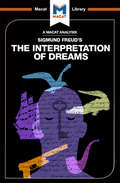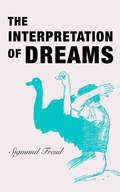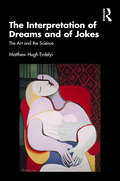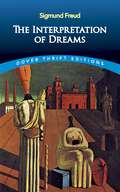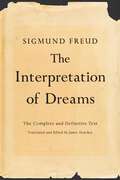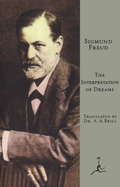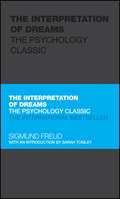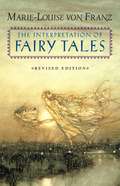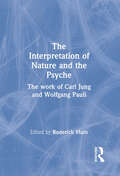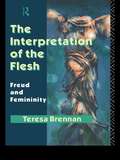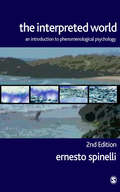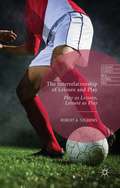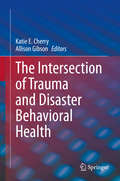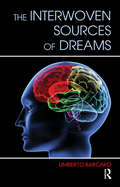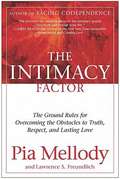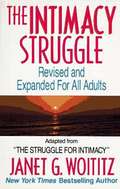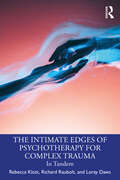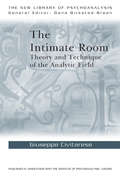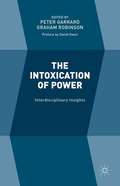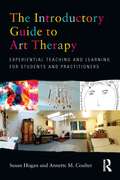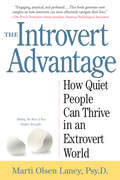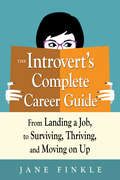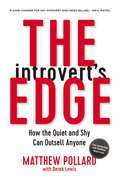- Table View
- List View
The Interpretation of Dreams
by William J JenkinsThere is arguably no more famous book about the arts of interpretation and analysis than Sigmund Freud’s 1899 Interpretation of Dreams. Though the original edition of just 600 copies took eight years to sell out, it eventually became a classic text that helped cement Freud’s reputation as one of the most significant intellectual figures of the 19th and 20th centuries. In critical thinking, just as in Freud’s psychoanalytical theories, interpretation is all about understanding the meaning of evidence, and tracing the significance of things. Analysis can then be brought in to tease out the implicit reasons and assumptions that lie underneath the interpreted evidence. Interpretation of Dreams is a masterclass in building telling analyses from ingenious interpretation of evidence. Freud worked from the assumption that all dreams were significant attempts by the unconscious to resolve conflicts. As a result, he argued, they contain in altered and disguised forms clues to our deepest unconscious urges and desires. Each must be taken on its own terms to tease out what they really mean. Though Freud’s theories have often been criticized, he remains the undisputed master of interpretation – with his critics suggesting that he was, if anything, too ingenious for his own good.
The Interpretation of Dreams (Great Works That Shape Our World Series)
by Sigmund FreudPublished at the turn of the century, The Interpretation of Dreams introduces readers to Freud’s theory of the unconscious with respect to dream interpretation and is widely regarded as one of Freud’s most significant works. Here Freud considers why we dream and what it means in the larger picture of our psychological lives, delving into theories of manifest and latent dream content, the special language of dreams, dreams as wish fulfillments, the significance of childhood experiences, and much more. Encompassing dozens of case histories and detailed analyses of actual dreams, this landmark text presents Freud’s legendary work as a tool for comprehending our sleeping experiences.
The Interpretation of Dreams and of Jokes: The Art and the Science
by Matthew Hugh ErdelyiThe Interpretation of Dreams and of Jokes provides a unique and integrative introduction to dream science. It addresses a notable gap in cognitive psychology on the subject of dreams and explores significant overlaps between the phenomena of dreams and jokes. Bringing together extensive research from cognitive psychology, neuroscience and psychoanalysis, the book provides a balanced approach to dream science that is underpinned by experimental and theoretical research. It considers the significance of dreams and their relationships to jokes, examining how both require an understanding of latent content in which context and individual differences play a large part. The book outlines a history of dream research and dream science and includes several original dream extracts for discussion. The book’s chapters explore how we can interpret meaning in dreams, how dreams might be indicators of inner psychological and somatic states, whether dreams can be used in problem-solving and the relationship between dreams and aphasia, memory and waking consciousness. This groundbreaking book will be essential reading for researchers and students from psychological and psychoanalytic backgrounds who are interested in the analysis and science of dreams.
The Interpretation of Dreams: The Complete And Definitive Text (Dover Thrift Editions)
by Sigmund Freud A. A. BrillUntil the beginning of the twentieth century, most people considered dreams unworthy of serious consideration. Sigmund Freud, however, had noticed that they formed an active part in the analysis of his patients, and he gradually came to believe that they represent struggles by the unconscious to resolve conflicts. In this classic of psychology, Freud explains the dual nature of dreams - their apparent content and their true, if hidden, meaning - as well as the concept of wish fulfillment and a universal language for interpreting dreams.This groundbreaking work also contains Freud's introduction of the notion that sexuality plays an important role in childhood, a theory that deeply shocked his contemporaries. Psychological journals rejected the book, and scientific publications ignored it, but the author recognized it as containing his greatest insights. The Interpretation of Dreams eventually helped set the stage for psychoanalytic theory, and it remains Freud's most original work.
The Interpretation of Dreams: The Complete and Definitive Text
by Sigmund Freud James StracheyWhat are the most common dreams and why do we have them? What does a dream about death mean? What do dreams of swimming, failing, or flying symbolize? First published by Sigmund Freud in 1899, The Interpretation of Dreams considers why we dream and what it means in the larger picture of our psychological lives. Delving into theories of manifest and latent dream content, the special language of dreams, dreams as wish fulfillments, the significance of childhood experiences, and much more, Freud, widely considered the "father of psychoanalysis,” thoroughly and thoughtfully examines dream psychology. Encompassing dozens of case histories and detailed analyses of actual dreams, this landmark text presents Freud’s legendary work as a tool for comprehending our sleeping experiences. Renowned for translating Freud’s German writings into English, James Strachey--with the assistance of Anna Freud--first published this edition in 1953. Incorporating all textual alterations made by Freud over a period of thirty years, it remains the most complete translation of the work in print. Completely redesigned and available for the first time in trade paperback
The Interpretation of Dreams: The Psychology Classic (Capstone Classics Ser.)
by Sigmund FreudFor his historical period, The Interpretation of Dreams revolutionized the study of dreams and led to greater understanding of the aspects of the human personality as it related to psychopathology. This modern edition of the Interpretation of Dreams was translated to English by Daniel T. O'Hara and Gina Masucci MacKenzie and they made some changes to the previous edition. included extensive footnotes by Freud and the translators, endnotes by the translators, and an extensive introduction that included background material on Freud and his Times. The translators also gave an extensive bibliography including other works by Freud and biographies written about him. Finally, the translators provided comments from famous personages, briefly discussed translation issues, and asked readers insightful questions.
The Interpretation of Dreams: The Psychology Classic (Capstone Classics)
by Sigmund FreudPart of the bestselling Capstone Classics Series edited by Tom Butler-Bowdon, this collectible, hard-back edition of The Interpretation of Dreams provides an accessible and insightful edition of this important work of psychology Sigmund Freud's The Interpretation of Dreams introduced his ground-breaking theory of the unconscious and explored how interpreting dreams can reveal the true nature of humanity. Regarded as Freud's most significant work, this classic text helped establish the discipline of psychology and is the foundational work in the field of psychoanalysis. Highly readable and engaging, the book both provides a semi-autobiographical look into Freud’s personal life – his holidays in the Alps, spending time with his children, interacting with friends and colleagues – and delves into descriptions and analyses of the dreams themselves. Freud begins with a review of literature on dreams written by a broad range of ancient and contemporary figures – concluding that science has learned little of the nature of dreams in the past several thousand years. Although the prevailing view was that dreams were merely responses to ‘sensory excitation,’ Freud felt that the multifaceted dimensions of dreams could not be attributed solely to physical causes. By the time Freud began writing the book he had interpreted over a thousand dreams of people with psychoses and recognised the connection between the content of dreams and a person’s mental health. Among his conclusions were that a person’s dreams: Prefer using recent impressions, yet also have access to early childhood memories Unify different people, places, events and sensations into one story Usually focus on small or unnoticed things rather than major events Are almost always ‘wish fulfilments’ which are about the self Have many layers of meaning which are often condensed into a single image The Interpretation of Dreams: The Psychology Classic is as riveting today as it was over a century ago. Anyone with interest in the workings of the unconscious mind will find this book an invaluable source of original insights and foundational scientific concepts. This edition includes an insightful Introduction by Sarah Tomley, a psychology writer and practicing psychotherapist. Tomley considers paints a picture of Freud's life and times, reveals the place of The Interpretation of Dreams in the context of Freud's other writings, and draws out the key points of the work.
The Interpretation of Fairy Tales: Revised Edition
by Marie-Louise von FranzOf the various types of mythological literature, fairy tales are the simplest and purest expressions of the collective unconscious and thus offer the clearest understanding of the basic patterns of the human psyche. Every people or nation has its own way of experiencing this psychic reality, and so a study of the world's fairy tales yields a wealth of insights into the archetypal experiences of humankind.Perhaps the foremost authority on the psychological interpretation of fairy tales is Marie-Louise von Franz. In this book—originally published as An Introduction to the Interpretation of Fairy Tales —she describes the steps involved in analyzing and illustrates them with a variety of European tales, from "Beauty and the Beast" to "The Robber Bridegroom."Dr. von Franz begins with a history of the study of fairy tales and the various theories of interpretation. By way of illustration she presents a detailed examination of a simple Grimm's tale, "The Three Feathers," followed by a comprehensive discussion of motifs related to Jung's concept of the shadow, the anima, and the animus. This revised edition has been corrected and updated by the author.
The Interpretation of Nature and the Psyche: The work of Carl Jung and Wolfgang Pauli
by Wolfgang Pauli C. G. JungThis book includes essays that emphasize the part played by pre-existing images or archetypes in the development of concepts and scientific theories and stress the need for complementary principles in nature. It is a translation of "Synchronizitat als ein Prinzip akausaler Zusammenhange". In 1952 Carl Jung and Wolfgang Pauli, both at the height of their reputations, co-wrote The Interpretation of Nature and the Psyche. It contained one essay by each author: Jung’s presents a challenge to mainstream science and advances the principle of synchronicity and Pauli’s argues for a more holistic conception of modern science. Roderick Main presents the original essays here with a brand-new introduction and commentary which reviews how the original text was viewed, and which traces the subsequent influences of both the essays and the two authors.
The Interpretation of the Flesh: Freud and Femininity
by Teresa BrennanThe `riddle of femininity', like Freud's reference to women's sexuality as a `dark continent', has been treated as a romantic aside or a sexist evasion, rather than a problem to be solved. In this first comprehensive study, Teresa Brennan suggests that by placing these theories in the context of Freud's work overall, we will begin to understand why femininity was such a riddle for Freud.
The Interpreted World: An Introduction to Phenomenological Psychology
by Dr Ernesto SpinelliPraise for First Edition: `This book is highly recommended to a wide range of people as a clear and systematic introduction to phenomenological psychology... the book has set the stage for possible new colloquia between the phenomenological and other approaches in psychology' - Changes `As a trainee interested in matters existential, I have been put off in the past by the long-winded and confusing texts usually available in academic libraries. Thankfully, here is a text that remedies that situation... [it] provides a readable and insightful account' - Clinical Psychology Forum 'Spinelli's classic introduction to phenomenology should be essential reading on all person-centred, existential and humanistic trainings, and any other counselling or psychotherapy course which aims to help students develop an in-depth understanding of human lived-experience. This book is sure to remain a key text for many years to come' - Mick Cooper, Senior Lecturer in Counselling, University of Strathclyde 'This is by far the most monumental, erudite, comprehensive, authoritative case that Existentialism and Phenomenology (a) have a rightful place in the academy; (b) are tough-minded bodies of thought; (c) have rigorous scientific foundations; (d) bequeath a distinctive school of psychotherapy and counselling; and (e) are just as good as the more established systems of psychology' - Alvin R. Mahrer, Ph.D. University of Ottawa, Canada, Author of The Complete Guide To Experiential Psychotherapy 'This book's rich insight into the lacunae of modern psychological thinking illustrates the contribution that existential phenomenology can make to founding a coherently mature Psychology that is both fully human(e) and responsibly 'scientific' in the best sense of that term' - Richard House, Ph.D., Magdalen Medical Practice, Norwich; Steiner Waldorf teacher. The Interpreted World, Second Edition, is a welcome introduction to phenomenological psychology, an area of psychology which has its roots in notoriously difficult philosophical literature. Writing in a highly accessible, jargon-free style, Ernesto Spinelli traces the philosophical origins of phenomenological theory and presents phenomenological perspectives on central topics in psychology - perception, social cognition and the self. He compares the phenomenological approach with other major contemporary psychological approaches, pointing up areas of divergence and convergence with these systems. He also examines implications of phenomenology for the precepts and process of psychotherapy. For the Second Edition, a new chapter on phenomenological research has been added in which the author focuses on the contribution of phenomenology in relation to contemporary scientific enquiry. He describes the methodology used in phenomenological research and illustrates the approach through an actual research study. The Interpreted World, Second Edition demystifies an exciting branch of psychology, making its insights available to all students of psychology, psychotherapy and counselling.
The Interrelationship of Leisure and Play: Play As Leisure, Leisure As Play (Leisure Studies in a Global Era)
by Robert StebbinsIn the scientific studies of play and leisure there has been an unfortunate tendency for the enthusiasts of one to ignore the contributions made by their colleagues in the other. This book shows what the two fields have been missing because of this isolation. The new idea of augmentative play enables us to examine how and where play and leisure are often vitally dependent on each other. Augmentative play is a special activity that aids substantially the pursuit of a larger, encompassing leisure activity. This approach to the study of play is unique. It recognizes the hundreds of activities in which play and leisure come together, sometimes to produce deeply fulfilling experiences and outcomes for participants, other times to produce more fleeting enjoyment for them.
The Intersection of Trauma and Disaster Behavioral Health
by Katie E. Cherry Allison GibsonThis contributed volume examines the intersection of trauma and disaster behavioral health from a lifespan perspective, filling a critical gap in the literature on disaster mental health research. In the chapters, the contributors evaluate behavioral data of adults exposed to various environmental events in both the United States (i.e., the 2017 Hurricanes Irma in Florida and Harvey in Houston) and abroad (i.e., missile fire in the 2014 Israel-Gaza conflict). Contributors also suggest future directions, practices, and policies for trauma and disaster response. The three parts of the book provide an overview of disaster behavioral health across the lifespan, propose practical applications of research theories to psychosocial problems resulting from disasters and trauma, and evaluate disaster and trauma interventions from a macro-level perspective. Topics explored among the chapters include:Integrating Trauma-Informed Principles into Disaster Behavioral Health Targeting Older Adults Cultural Competence and Disaster Mental Health When Disasters Strike: Navigating the Challenges of “Sudden Science” Frameworks of Recovery: Health Caught at the Intersection of Housing, Education, and Employment Opportunities After Hurricane Katrina Substance Use Issues and Behavioral Health After a Disaster Psychosocial Recovery After Natural Disaster: International Advocacy, Policy, and RecommendationsThe Intersection of Trauma and Disaster Behavioral Health is a vital resource for researchers whose expertise covers the domains of trauma, health and wellness, and natural and technological disasters. The book also is a useful supplement to graduate courses in psychology, sociology, social work, disaster science, human ecology, and public health.
The Interwoven Sources of Dreams
by Umberto BarcaroThe subject of this book is the study of dreaming from a specific point of view, one that provides useful and enlightening results: the analysis of the complex patterns of links among the memory sources of dreams. The significance of these patterns is logical and emotional at the same time. This approach is interdisciplinary: it directly involves the fields of psychology, psychotherapy, linguistics, computer science, mathematics (graph theory), history of psychology, literature, and motion pictures. However, no specific advanced expertise in any of these fields is required for understanding the various contents. The book is divided into three parts. Part 1 is dedicated to theories and methodologies regarding dream functions and dream interpretations: these theories and methodologies are considered in the perspective of their implications for the study of links among dream sources. Some meaningful examples of dreams, or metaphors or dreams, that can be found in poetry or motion pictures, are also considered.
The Intimacy Dance: A Guide to Long-Term Success in Gay and Lesbian Relationships
by Betty BerzonGuide to same-sex relationships.
The Intimacy Factor
by Lawrence S. Freundlich Pia MellodyIn her first book in over 10 years, Pia Mellody--author of the groundbreaking bestsellers Facing Codependence and Facing Love Addiction--shares her profound wisdom on what it takes to sustain true intimacy and trusting love in our most vital relationships. Drawing on more than 20 years' experience as a counsellor at the renowned Meadows Treatment Centre in Arizona, Mellody now shares what she has learned about why intimate relationships falter--and what makes them work. Using the most up-to-date research and real-life examples, including her own compelling personal journey, Mellody provides readers with profoundly insightful and practical ground rules for relationships that achieve and maintain joyous intimacy. This invaluable resource helps diagnose the causes of faulty relationships--many of them rooted in childhood--and provides tools for readers to heal themselves, enabling them to establish and maintain healthy relationships.
The Intimacy Struggle: Revised and Expanded for all Adults
by Janet Geringer WoititzThe struggle for intimacy is a complex issue, key to the happiness of every man and woman. It goes on for all of us as long as we live. To be intimate is to be close, to be vulnerable, qualities that are very different from the survival skills we learned. This book will help clarify the issues for you.
The Intimate Edges of Psychotherapy for Complex Trauma: In Tandem
by Loray Daws Richard Raubolt Rebecca KlottThe Intimate Edges of Psychotherapy for Complex Trauma is a personal account of an analysis spanning more than 20 years, written by practicing psychoanalysts. This book is the first to document an on-going analysis where both analyst and analysand are seasoned psychologists capable of articulating the relational analytic process theoretically and personally. Rebecca Klott shares a narrative of complex, severe sexual and emotional trauma, with commentary provided by her analyst, Richard Raubolt. Klott and Raubolt create an embodied dialogue, exposing what treatment is like for both the severely traumatized patient and the clinician tasked with helping the patient work toward healing. Through this intimate vantage point, the reader journeys with both patient and clinician as they encounter the breakdowns and breakthroughs that are a part of the process of healing. The Intimate Edges of Psychotherapy for Complex Trauma will be essential reading for clinicians, trainees, and students in the fields of psychoanalysis, psychoanalytic psychotherapy, counseling, social work, and counseling and clinical psychology.
The Intimate Room: Theory and Technique of the Analytic Field (New Library of Psychoanalysis)
by Giuseppe CivitareseThe Intimate Room provides an original exploration of psychoanalytic thought, showing how contemporary psychoanalysis seeks to answer the challenges raised by today’s post-modern culture. Offering a deeply personal and insightful reading of Bion, this book acts as a stimulating guide to the development of the theory of the analytic field and both its technical and clinical implications. As such topics of discussion include: the concept of the internal setting the rhetoric of interpretation the 'subversive' notion of Nachträglichkeit the role played by characters in analytic discourse the bi-personal field as virtual reality new concepts of transference. Allowing the reader to engage with the inner space of analysis, The Intimate Room will be of interest to psychoanalysts, psychotherapists and all those with an interest in the field of psychoanalysis. It will also be a useful tool in psychoanalytic and psychotherapeutic work on a day-to-day basis.
The Intimate University: Korean American Students and the Problems of Segregation
by Nancy AbelmannThe majority of the 30,000-plus undergraduates at the University of Illinois, Urbana-Champaign--including the large population of Korean American students--come from nearby metropolitan Chicago. Among the campus's largest non-white ethnicities, Korean American students arrive at college hoping to realize the liberal ideals of the modern American university, in which individuals can exit their comfort zones to realize their full potential regardless of race, nation, or religion. However, these ideals are compromised by their experiences of racial segregation and stereotypes, including images of instrumental striving that set Asian Americans apart. In The Intimate University, Nancy Abelmann explores the tensions between liberal ideals and the particularities of race, family, and community in the contemporary university. Drawing on ten years of ethnographic research with Korean American students at the University of Illinois and closely following multiple generations of a single extended Korean American family in the Chicago metropolitan area, Abelmann investigates the complexity of racial politics at the American university today. Racially hyper-visible and invisible, Korean American students face particular challenges as they try to realize their college dreams against the subtle, day-to-day workings of race. They frequently encounter the accusation of racial self-segregation--a charge accentuated by the fact that many attend the same Evangelical Protestant church--even as they express the desire to distinguish themselves from their families and other Korean Americans. Abelmann concludes by examining the current state of the university, reflecting on how better to achieve the university's liberal ideals despite its paradoxical celebration of diversity and relative silence on race.
The Intoxication of Power: Interdisciplinary Insights
by David Owen Graham Robinson Peter GarrardThe Intoxication of Power is a collection of contributions by thirteen authors from various academic disciplines sharing a concern for the development of understanding of the nature and origins of leadership hubris. The book originated at conferences held by the Daedalus Trust, which fosters research into challenges to organizational well-being.
The Introductory Guide to Art Therapy: Experiential teaching and learning for students and practitioners
by Susan Hogan Annette M. CoulterThe Introductory Guide to Art Therapy provides a comprehensive and accessible text for art therapy trainees. Susan Hogan and Annette M. Coulter here use their combined clinical experience to present theories, philosophies and methods of working clearly and effectively. The authors cover multiple aspects of art therapy in this overview of practice, from working with children, couples, families and offenders to the role of supervision and the effective use of space. The book addresses work with diverse groups and includes a glossary of key terms, ensuring that complex terminology and theories are clear and easy to follow. Professional and ethical issues are explored from an international perspective and careful attention is paid to the explanation and definition of key terms and concepts. Accessibly written and free from jargon, Hogan and Coulter provide a detailed overview of the benefits and possibilities of art therapy. This book will be an indispensable introductory guide for prospective students, art therapy trainees, teachers, would-be teachers and therapy practitioners. The text will also be of interest to counsellors and other allied health professionals who are interested in the use of visual methods.
The Introvert Advantage: Making The Most Of Your Inner Strengths
by Psy. D. Marti Olsen LaneyAt least one out of four people prefers to avoid the limelight, tends to listen more than they speak, feels alone in large groups, and requires lots of private time to restore their energy. They're introverts, and here is the book to help them boost their confidence while learning strategies for successfully living in an extrovert world. <P><P> After dispelling common myths about introverts-they're not necessarily shy, aloof, or antisocial--The Introvert Advantage explains the real issues. Introverts are hardwired from birth to focus inward, so outside stimulation-chitchat, phone calls, parties, office meetings-can easily become "too much." <P> The Introvert Advantage dispels introverts' belief that something is wrong with them and instead helps them recognize their inner strengths-their analytical skills, ability to think outside the box, and strong powers of concentration. It helps readers understand introversion and shows them how to determine where they fall on the introvert/extrovert continuum. It provides tools to improve relationships with partners, kids, colleagues, and friends, offering dozens of tips, including 10 ways to talk less and communicate more, 8 ways to showcase your abilities at work, how to take a child's temperament temperature, and strategies for socializing. Finally, it shows how to not just survive, but thrive-how to take advantage of the introvert's special qualities to create a life that's just right for the introvert temperament, to discover new ways to expand their energy reserves, and even how, when necessary, to confidently become a temporary extrovert.
The Introvert's Complete Career Guide: From Landing a Job, to Surviving, Thriving, and Moving On Up
by Jane FinkleWhat do Elon Musk, Warren Buffet, Marissa Mayer, and Bill Gates all have in common outside of being wildly successful? They are all introverts. <P><P>In today's fast-paced, unstable workplace achieving success requires speaking up, promoting oneself and one's ideas, and taking initiative. Extroverts, fearless in tooting their own horns, naturally thrive in this environment, but introverts often stumble. If you question your ability to perform and succeed in this extroverted work culture, The Introvert's Complete Career Guide is custom fit for you.In this supportive, all-inclusive handbook, Jane Finkle demonstrates how to use your introverted qualities to their best advantage, then add a sprinkling of extroverted skills to round out a forceful combination for ultimate career success. Finkle shares the keys to navigating each stage of professional development--from self-assessment and job searching, to survival in a new position and career advancement. <P><P>In The Introvert's Complete Career Guide you will learn to:Build confidence by evaluating your values, personality style, interests, and achievements <P><P>Write the story of your career in resume and LinkedIn formats <P><P>Use social media at your own comfort level to promote your career and expand your network <P><P>Express yourself clearly and confidently in network meetings, interviews, and workplace situations <P><P>Build strong professional relationships with colleagues and senior leaders <P><P>Overcome fears that prevent you from embracing new challenges <P><P>Equally applicable to the real or virtual workplace, The Introvert's Complete Career Guide provides strategies, tools, and success stories that win you the professional respect and recognition you deserve.
The Introvert's Edge: How the Quiet and Shy Can Outsell Anyone
by Derek Lewis Matthew PollardAn introvert? Great at sales? YES.Sales is a skill anyone can learn and master — and introverts are especially good at it once they learn how to leverage their natural strengths.Introverts aren’t comfortable with traditional tactics like aggressively pushing a product or talking over a customer’s objections. That’s the beauty of The Introvert’s Edge: it doesn’t focus on the sale itself but on a sales system that helps introverts feel sincere instead of sales-y. Powerful and practical, the book reveals how to:Find natural confidencePrepare for every situationPresent your value so that customers want to buySidestep objectionsJudge when the customer’s ready to buyAsk for the sale — without askingContinually adapt and improveProfit from a process that doesn’t rely on personalityEnjoy salesWith stories of introverted entrepreneurs, salespeople, and business owners who went from stagnant to success, The Introvert’s Edge shows you how to succeed in sales — without changing who you are.
